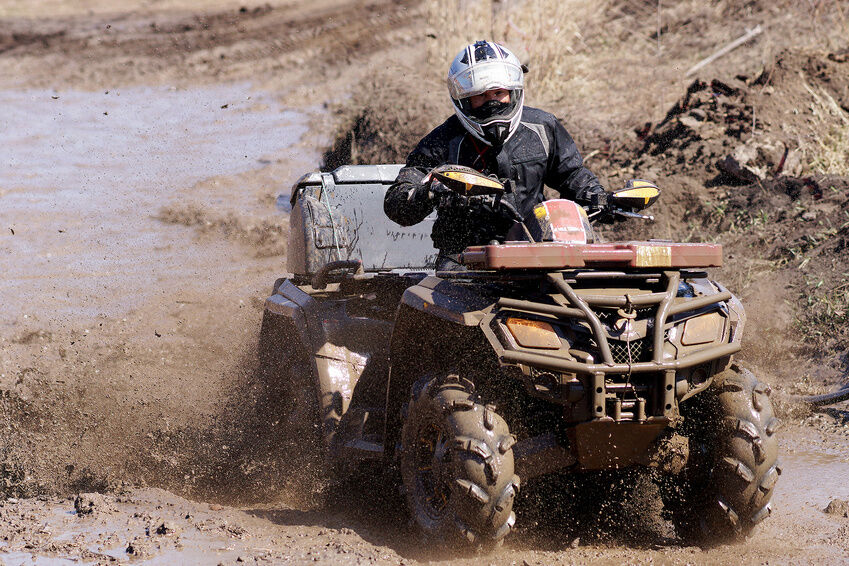Although carrying insurance on your all-terrain vehicle (ATV) is not required by all states in the U.S., many states require some coverage. In the majority of states that require you to insure your ATV, the regulation applies to ATV owners and operators who are using the vehicles on public land and in state or public park areas. If you are currently financing your ATV you may also be required to have specified coverage for your recreational or sports vehicle.
When purchasing your first all-terrain vehicle, be sure to determine where you will be using the ATV and also whether or not it must be insured in your state of residence. Even if your state has no requirement stating that you must purchase insurance to cover your ATV, choosing to carry insurance for your vehicle can prove worthwhile and even wise.
Buying ATV insurance coverage is actually the best way to protect your four-wheeler and yourself when you are out on a trail (or traveling the road on your way to a trail). If you own an all-terrain vehicle and use it regularly, or even for occasional weekend recreational excursions or sports enjoyment, you should keep these facts in mind concerning insuring the vehicle:
- ATVs are highly susceptible to theft.
- Your ATV may not be covered by your homeowners insurance if you ride your vehicle on any terrain that is not your property.
- Your homeowners insurance may not cover your ATV if you haul it by trailer to another location.
- ATV insurance may be required by state or public parks where you choose to use your ATV.
- Carrying ATV coverage on your four-wheeler can be just as valuable as wearing your helmet when riding.
Does Car Insurance or Homeowners Insurance Cover Your ATV?
Your ATV insurance may not be covered by either car insurance or homeowners insurance. Many people assume that their ATVs are covered as part of their contents or personal property coverage of a homeowners insurance policy. However, in many instances, this may be a misconception. You often need a separate ATV insurance policy to cover your every-terrain vehicle or off-road vehicle, for property and liability.
In general, homeowners insurance does not protect your ATV if it incurs damage during an accident since your property coverage does not usually cover vehicles. The only motor-operated vehicles that may possibly be protected by homeowners coverage are small electric scooters or similar vehicles of limited size and power.
However, if an ATV accident occurred due to a defective condition in the land where it was being operated (which caused the accident) an injured victim may be able to receive compensation from the landowner’s insurance company. All-terrain vehicles are not normally covered by a car insurance policy which provides compensation to accident victims. If an accident involving an ATV is the result of the ATV driver’s error or carelessness and causes bodily injury, the victim will need to determine whether or not the ATV driver is covered by some type of insurance that will compensate the victim for injuries (such as some form of health insurance).
Does Health Insurance Cover ATV Accidents?
Some ATV owners and riders have been involved in accidents that resulted in bodily injury to another party or to themselves when riding their ATVs and sought compensation through their health insurance policies. Only after the accident did they discover that their health insurance company refused to pay medical bills or issue any compensation relative to their accidents.
Some of the ATV owners then used the language included in their policies to contest the refusal for compensation. They were able to do this because their policies included text that refused coverage and compensation for injuries resulting from taking part in a dangerous or hazardous activity, sport or hobby that could result in bodily harm.
Since the examples of the hazardous, dangerous activities were “skydiving, auto racing, hang gliding, jet ski operating or bungee jumping,” they were able to contest their refusal for compensation legally. Some of these policyholders did finally win their cases and receive their requested health insurance compensation for ATV accident injuries.
If you have difficulty determining whether or not your health insurance policy will compensate injuries from an accident involving an ATV due to the language used in the policy, and your insurer will not definitely confirm that such compensation is allowed, you should seek the assistance of an attorney. You can also check to see what Exclusions your health insurance coverage offers and what it does not cover. If the language is unclear, consult your Human Resources director at work to determine if injuries incurred in an ATV crash will be compensated by your coverage. It is always best to be informed before an accident occurs.
What Does ATV Insurance Cover?
Similar to some aspects of auto insurance, ATV coverage is structured to cover certain costs incurred due to a mishap, incident or accident along with theft of your all-terrain vehicle. This type of insurance coverage will help you to recover financially after an ATV spill, turn-over or crash. It will compensate for costs associated with vehicle repairs, bodily injuries and lawsuits, just as auto insurance does. A good ATV policy can prevent you from having unmanageable out-of-pocket expenses following an accident.
If you are involved in an ATV accident that causes bodily injuries or damages, your ATV insurance provider can assist you with starting the insurance claims process so that you can receive compensation. To start the claims process, you will need to supply appropriate accident-related documentation, including photos of the resulting damages. After an insurance adjuster reviews your documents and photos, your compensation will be calculated and issued to you according to the amount of insurance coverage, type of damage or loss and your deductible.
The best ATV insurance policies include the following types of coverage to protect you and others from injuries and damages resulting from an ATV accident:
Liability Coverage:
- Property Damage Liability Coverage – protects you from specified damages that are caused to someone else’s property while you are operating your ATV. In the majority of cases, this coverage covers the costs of your attorney if another involved party brings legal charges against you.
- Bodily Injury Liability Coverage – protects you from specific damages if you injure or kill a person while you are driving your ATV. In most instances, it covers attorney fees if another party involved in the accident sues you.
Collision Coverage – pays for all damages (covered by your policy) that are caused to your ATV if it collides with, or is struck by, another vehicle or an object. This type of insurance coverage is generally offered with a $500 or $1,000 deductible. Damages to your all-terrain vehicle may be slight or extensive, and slight damages are not compensated for unless they cost more than $500 or until you have met your deductible.
Comprehensive Coverage – (or comprehensive physical damage coverage) protects you against losses from incidents aside from collision. These incidents may include theft, vandalism or the occurrence of fire. This insurance coverage is offered with a $500 to $1,000 deductible. It covers only damages that affect your ATV’s body or threaten the safe operation of your vehicle.
Medical Payments Coverage – in general, most ATV coverage policies permit you to choose medical coverage for yourself and for your passengers. Although some ATV owners and operators may consider this coverage to be unnecessary, it is always advisable to ensure that you have adequate medical payments coverage to pay any medical treatment expenses that may be required if you should be involved in an accident while driving your ATV.
Uninsured/Under-insured Motorists Coverage – insures you against specific damages if an ATV accident occurs on a highway, thoroughfare or public roadway in which your ATV is struck (while you are driving it or are legally parked) by another driver with no insurance coverage or a lesser amount of coverage than you have. This uninsured vehicle must be designed to be insurable (for example, a car, truck or motorcycle) and be properly registered to be operated on a public road, highway or thoroughfare.
How Much ATV Insurance Do You Need?
Since every ATV and ATV driver are different, the way you use your all-terrain vehicle will help you best decide how much ATV coverage you need. If you use your vehicle for dune riding on beaches with good visibility, you most likely need less coverage than if you ride in the woods where visibility is often obstructed by hills, trees and wild, untrimmed bushes. Other important factors to consider when deciding how much ATV coverage to purchase are the value of your vehicle and the total value of assets that you want to protect from any potential liability claims brought against you if you should have an ATV accident.
Even if you operate your ATV in safe locations with clear visibility, you should always take into consideration how much of a risktaker or daredevil you tend to be when using your ATV for sport and recreation. You can contact an insurance expert in a trusted network for advice before choosing your ATV coverage. These agents support consumers’ interests and can obtain accurate insurance quotes quickly and efficiently for you.
As An Off-Roader, What Does ATV Insurance Get You?
Some ATV enthusiasts are so focused on the fast-paced, heart-pounding thrills they get from driving their ATVs for sports and recreational enjoyment that they forget to discover what good ATV coverage can offer to all-surface vehicle owners and operators. The best ATV policies offer a comprehensive package of benefits, including coverage for collision, property damage liability, bodily injury liability, comprehensive physical damage, medical payments and uninsured/under-insured motorists.
How Much Does ATV Insurance Cost?
ATV coverage rates can vary from several hundred dollars to more than one thousand dollars annually. Atv insurance costs are dependent on the type and extent of coverage chosen and different state insurance requirements. ATV operators who have frequent traffic violations or accidents are usually considered high risk drivers and will most likely be charged higher rates. Another factor is the make, model and engine type of your ATV as well as its classification as an on-road or off-road vehicle.
If you use your ATV every day, you will normally be considered a higher risk client to insure and will probably pay higher Atv insurance quote for your coverage. If you or another user of your all-terrain vehicle are in the young driver age range, your premiums will be higher than an older driver who has proven to be a safe ATV operator. Some insurers actually place age restrictions on insured ATV drivers. If you use your ATV most often for orderly road driving and have a safe driving record, your Atv insurance quote will most likely be lower than those of another ATV operator who goes on risky, off-road jumping or racing trips.
Are There Any ATV Insurance Exclusions?
There have been instances in which some insurers who offer ATV coverage denied compensation based on clauses in their policies that called for denial of coverage if an ATV owner was injured or caused injury or property damage while loading or unloading cargo or products on commercial property. However, the majority of liability claim denials by these insurance companies are generally based on reckless or risky operation of these four-wheel, all-surface vehicles which led to an accident and bodily or property damage. These denied liability claims involved both injury to the driver and to other parties and damage to property of the ATV owner and of other parties.
FAQs
An ATV, or all-surface vehicle, is defined by the American National Standards Institute as an off-road vehicle that has four low-pressure (non-pneumatic) tires and a seat that the operator straddles when driving. This recreational sports vehicle is steered by handlebar control and can travel on smooth or rough terrain, as needed or desired.
Although most ATV owners consider these vehicles to be very safe for fast-paced driving, racing and jumping over rough and even dangerous ground, rocks and ravines and gaps in hillside rock formations, a significant number of accidents do occur annually involving drivers of diverse ages. For this reason, it is wise to carry ATV coverage to cover any mishaps, incidents or accidents that may occur while you are operating your ATV.
All the best quality ATV policies include a medical payment coverage option. Most insurers allow you as the policy owner to choose medical coverage for yourself and for your passengers. Some people who own and operate these all-surface vehicles may think that this passenger coverage is not needed and can be treated as insignificant. However, your insurance agent will advise you that it is always best to carry medical payment coverage for yourself and your passengers to cover any medical treatments and expenses that could be required for everyone riding in your ATV if an accident should occur.
The other types of coverage included in ATV insurance cover the driver and any other parties, including drivers of other vehicles and pedestrians who are struck and injured during an accident that occurs and is caused by your ATV with you as its operator. The other types of insurance coverage generally included in an ATV policy are coverage for collision, property damage liability, bodily injury liability, comprehensive physical damage, medical payments and uninsured/under-insured motorists. The bodily injury liability coverage can also include passengers of the ATV driver who is responsible for an accident.
Although not all states require ATV owners to carry ATV coverage, many do require that you have at least limited coverage if you are operating your vehicle on public land, including public and state parks. You may also be required to purchase some ATV coverage if you are financing your vehicle. Contact Alchemy Insurance for Top Quality ATV Insurance Coverage
When you contact the experts at Alchemy Insurance with locations in the states of Pennsylvania, Maryland, Texas and Delaware, you will receive excellent comprehensive information and advice concerning purchasing ATV coverage. Our team of experienced professionals will guide you to selecting the ideal insurance policy to protect you, your passengers and other on and off-road drivers and pedestrians that you encounter while enjoying operating your all-terrain vehicle. You can reach our insurance experts today by phone, by email or on the company website at alchemyinsurance.com.




